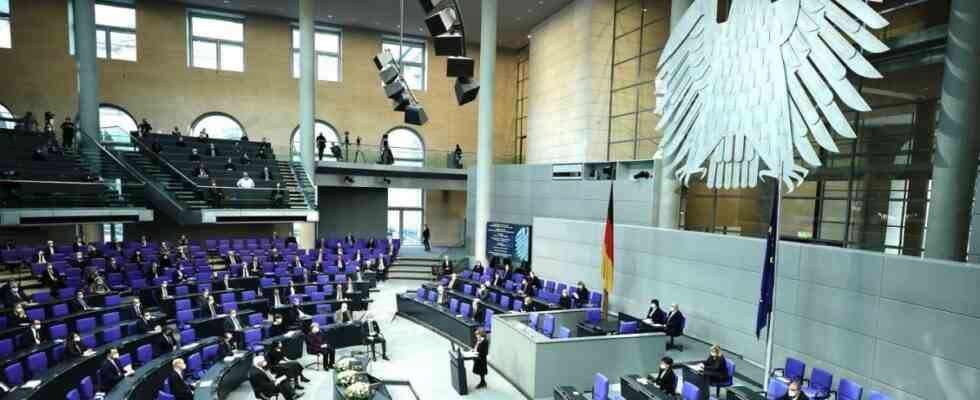Nationwide, the victims of National Socialism are commemorated this Friday. There was a commemoration in the Bundestag. Federal President Frank-Walter Steinmeier and Federal Chancellor Olaf Scholz (SPD) also took part. The focus of the commemoration was on people who were persecuted by the National Socialists because of their sexual orientation or identity.
Bundestag President Bärbel Bas opened the special event in Parliament. “Many in Germany think we’ve already dealt with the Shoah enough,” she said. That is a mistake. “There can be no final line.” A free, open society cannot be taken for granted. This has been shown by racist, anti-Semitic, anti-Gypsy and anti-queer acts in the recent past. “‘Never again’ – that’s an order. For all of us. Every day. Where hatred spreads, nobody is safe,” says Bas.
Holocaust survivor Rozette Kats gave a speech at the Bundestag commemoration. “Everyone who was persecuted back then deserves to be remembered with respect,” said the 80-year-old, referring in particular to the persecution of sexual and gender minorities under the Nazi regime, which the parliament placed at the center of the commemoration this year. “Everyone who is being persecuted today is entitled to our recognition and our protection,” she added, referring to today’s exclusion and violence against homosexuals.
In her speech, Kats complained that it took decades for victim groups such as Sinti and Roma as well as homosexuals to be recognized as victims of the Nazis. This allowed the ideology of the Nazis to continue to have an effect and still does, “if we still have to experience acts of violence against queer people”.
“That was my deliverance”
Kats described her own fate moving in front of the parliament. In 1943, when she was eight months old, her parents hid her with a couple in Amsterdam before they were deported and murdered in Auschwitz. The evening before her sixth birthday, her adoptive father informed her about her real parents. This raised questions and scared her. “Everything was way too awful for a kid of six,” said Kats. Out of fear, she decided to continue wearing the mask of the “non-Jewish child”. She led a double life that made her sick. It was only in 1992 at a conference for children hiding from the Nazis that she met other people who shared her fate. “That was my liberation,” said Kats.
Since then she has been reporting about her story in schools and memorials. Her life improved as a result. Today, Kats is committed to ensuring that sexual and gender minorities in particular receive recognition for the suffering they have suffered and can live as they want today. “I haven’t forgotten how bad it is to have to be in denial and hide,” she said.
Scholz to Germany’s historical responsibility
Before the event in the Bundestag, Scholz recalled Germany’s historical responsibility for the murder of millions of Jews during the National Socialist era. He wrote on Twitter: “The suffering of six million innocently murdered Jews is unforgotten – just like the suffering of the survivors.” To ensure that this never happens again, Germany’s historical responsibility is remembered on Holocaust Remembrance Day.
On January 27, 1945, Red Army soldiers liberated the survivors of the German concentration and extermination camp at Auschwitz in occupied Poland. The Nazis had murdered more than a million people there.
In 1996, the then Federal President Roman Herzog declared the day of the liberation of the Nazi concentration camp in Auschwitz as a day of remembrance. Events are planned across the country to commemorate the Jews, Sinti and Roma, disabled people and representatives of other victim groups who were persecuted and murdered by the Nazis.

